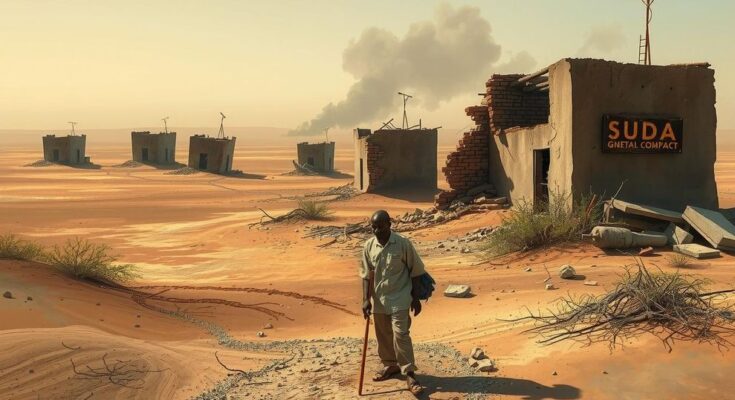A cholera outbreak in Sudan has claimed 172 lives, with over 2,500 reported ill recently. The infection is spreading mainly in Khartoum and Omdurman due to poor sanitation and water access following the civil war. Doctors Without Borders warns of increasing case severity and overwhelmed treatment facilities. Previous cholera outbreaks have highlighted persistent health crises in the region amidst ongoing conflict.
CAIRO — A devastating cholera outbreak in Sudan has resulted in at least 172 fatalities, with over 2,500 individuals reporting illness just this past week. The outbreak is primarily centered in Khartoum and the nearby city of Omdurman, where returning residents from the ongoing civil war are finding inadequate access to clean water and sanitation. This exacerbation of conditions is tragic, as much of the country’s health infrastructure has crumbled amid the ongoing conflict.
Recent updates reveal the severity of the situation. According to the Health Ministry, the daily record of new cases has surged from 90 to a staggering 815 between May 15 and May 25. The total number of reported cholera diagnoses since January has exceeded 7,700, disproportionately affecting vulnerable populations like children under four, who account for over 1,000 cases. While Khartoum and Omdurman claim most cases, other provinces are beginning to report infections as well.
Joyce Bakker, who coordinates efforts in Sudan for Doctors Without Borders, described the overwhelming conditions at treatment centers, stating that many new patients arrive in desperate need of care. She noted, “The scenes are disturbing… we don’t know the true scale of the outbreak,” indicating that the organization is only able to witness a fraction of the chaos.
What has precipitated this outbreak? Khartoum and Omdurman, once bustling urban centers, have been transformed into battlegrounds during the civil conflict. Following the military’s recapture of the area from the Rapid Support Forces in March, approximately 34,000 displaced individuals have returned. However, they find homes damaged and essential services like clean water disrupted due to attacks on power plants and extensive fighting.
Dr. Rania Elsayegh from Sudan’s Doctors for Human Rights remarked on the dire conditions impacting the populace: “People have been drinking polluted water and transferring water into unhygienic containers.” Furthermore, health workers express serious concerns about the spread of infections, especially with many people being forced into crowded displacement centers, which inhibit proper isolation of those affected. According to Dr. Sayed Mohamed Abdullah from the Sudanese Doctors Union, over 80% of hospitals in the area remain out of service, compounding the crisis significantly.
Cholera, classified by the World Health Organization (WHO) as a “disease of poverty,” notoriously thrives in environments lacking sufficient sanitation and clean water sources. It is generally caused by the bacterium Vibrio cholerae and can manifest aggressively, leading to severe dehydration and even death if not treated promptly. Presently, the WHO’s global stockpile of critical oral cholera vaccines is alarmingly below the minimum threshold, making it increasingly difficult to control ongoing outbreaks. Ironically, since 2021, global cholera cases have surged due to a combination of poverty, armed conflict, and extreme weather events.
The current cholera crisis cannot be disentangled from the broader devastation inflicted by the ongoing civil war in Sudan. What began in April 2023, when tensions boiled over between military factions, has spiraled into widespread chaos. To date, over 24,000 have reportedly died, with more than 14 million displaced, many seeking refuge in neighboring nations. Crop failures and famine are now prevalent in multiple regions, especially devastated Darfur, heightening the humanitarian catastrophe.
Previous cholera outbreaks in Sudan have led to significant loss of life, such as the 700 deaths recorded in 2017 from a similar crisis. Conflict has repeatedly undermined efforts to contain the disease. Subsequent outbreaks have sickened tens of thousands, demonstrating the ongoing risks as health woes intensify.
And it is not just cholera. There are reports of other diseases surfacing as well, including a recent outbreak of dengue fever that has reported approximately 12,900 cases and claimed at least 20 lives. Additionally, meningitis has killed 12 people, highlighting the urgent health emergency unfolding in Sudan amidst the ongoing war.
The cholera outbreak in Sudan poses a serious humanitarian crisis, with alarming death tolls and widespread illness, particularly as access to clean water becomes scarcer. The civil war continues to devastate health infrastructure, leaving many without adequate treatment options. With cholera outbreaks and other diseases on the rise, the urgent need for intervention and support is paramount. The international community must act to address these dire conditions to prevent further loss of life and support the people of Sudan during this catastrophic period.
Original Source: www.newsday.com




